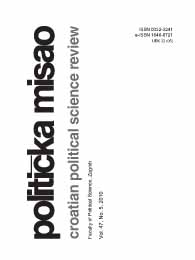How is Democracy Applied within the EU: Combining Elements of Traditional and Innovative Democratic Practice
How is Democracy Applied within the EU: Combining Elements of Traditional and Innovative Democratic Practice
Author(s): Hrvoje ButkovićSubject(s): Politics / Political Sciences
Published by: Fakultet političkih znanosti u Zagrebu
Keywords: European Union; Lisbon Treaty; representative democracy; participatory democracy; direct democracy; deliberative democracy
Summary/Abstract: The EU represents a new and complex political system which, according to numerous social scholars, suffers from the so-called democratic deficit. The basic argument behind this claim is that citizens lack control of the EU because, within its political system, national parliaments of member states possess only limited powers which have not been adequately compensated through steady empowerment of the European parliament (EP). Starting from this notion, the paper will explore the application of various concepts of democracy within the political system of the EU. First and foremost, it will analyse representative democracy in the EU, which stands as a foundation of all contemporary democratic systems. However, the paper will not stop at representative democracy, but it will also look at participatory, direct and deliberative democracy as applied within the political system of the EU. These concepts of democracy can only be viewed in relation and as an addition to representative democracy, but their application is very important for the EU due to limited possibilities for developing representative democracy at the supranational level. The paper will argue that, with regard to participatory and deliberative democracy, the EU can be viewed in many respects as a showcase for the national level, because it successfully developed various mechanisms related to implementation of these concepts. Particular attention will be paid to the Lisbon Treaty, which clarified many uncertainties that previously burdened the application of democracy within the EU. It will be argued that with the Lisbon Treaty the classic argument about the EU’s democratic deficit lost some of its appeal, because this treaty transformed the EP from secondary to equal participant in the EU’s legislative process.
Journal: Politička Misao
- Issue Year: XLVII/2010
- Issue No: 05
- Page Range: 27-43
- Page Count: 17
- Language: English

